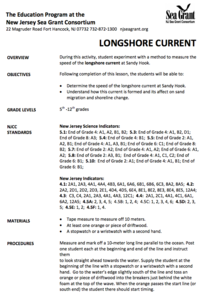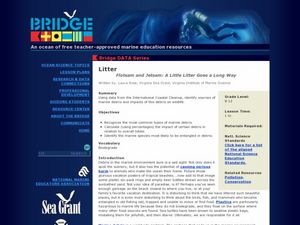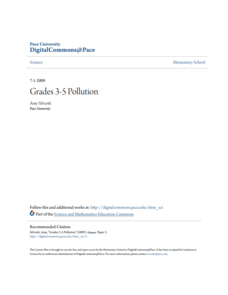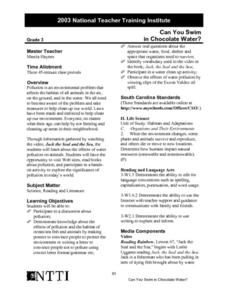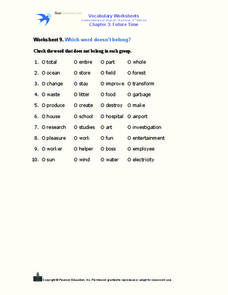Curated OER
Rubber Duckies and Ocean Currents
Learners explore marine life by conducting a rubber duck experiment. In this water currents lesson, students practice identifying latitude and longitude coordinates on a map and define the currents of major oceans. Learners discuss the...
Curated OER
Stewardship Activities
In this ocean pollution worksheet, students read the stewardship activities for ocean pollution. Students list 3 ways to help reduce pollution. Students then draw or write the items in the correct order of decomposition along the timeline.
Curated OER
Salt Marsh in a Pan
Students create a model of a salt marsh to discover the impact of pollution and human activities on water-based habitats including bays and the ocean. They recognize the relationship between natural and developed areas. Students impact...
Curated OER
Longshore Current
Learners are posted at the beginning and end of a 10-meter long line parallel to the ocean and are instructed to look straight ahead towards the water. The student at the beginning of the line uses a stopwatch, goes to the water's edge...
Curated OER
Geography Action! Rivers 2001- Human River
Students create a 'human river' by arranging themselves into a river pattern. Each student selects an article to represent a pollutant such as paper, book, or pencil. Students at the source of the river pass their pollutant on to the...
Curated OER
Trash Traits: Marine Debris, Litter, Ecology, Oceans
Students perform experiments to examine whether trash can float, blow around, or wash away. The effects of these characteristics on the presence of marine debris in the environment are then discussed.
Curated OER
LitterFlotsam and Jetsam: A Little Litter Goes a Long Way
Students explore the concept of environmental stewardship. For this science lesson, students investigate data from the International Coastal Cleanup, identify sources of marine debris, and discover the impacts of this debris on wildlife.
Curated OER
How Harmful Is It?
Students complete a form that requires them to make decisions about how severely different types of marine debris affect people, animals, vessels, communities. Results are totaled and analyzed to determine which types of marine debris...
Wilderness Classroom
Pollution
Educate scholars on pollution—air, water, and land—with a series of lessons that begin with a thorough explanation of each type. Learners then take part in three activities to reinforce the importance of reducing pollution. They...
Pace University
Pollution
Over the course of 10 days, scholars take a pre-assessment to place them in one of three leveled groups. Whole-class and in small groups, pupils take part in read-alouds, field trips, hands-on activities, and complete learning contracts...
Curated OER
Pollution Solution
Students explore the topic of oil pollution and how it affects the global ocean. They discuss oil spills in recent history and use problem solving skills to decide what strategies could be used to actually clean up an oil spill. Students...
Curated OER
Pollution Solution
Students explore the concept of environmental stewardship. In this science instructional activity, students investigate the effects of oil spills and brainstorm ideas to help companies avoid them as they create models to demonstrate...
Berkshire Museum
Reduce, Reuse, and Recycle: Sorting Through Personal Choices
Raise children's awareness about the importance of conservation with this hands-on science lesson. Start by breaking the class into groups and having them collect trash from around the school or local park. Students then use the provided...
Marine Institute
Water Pollution
Sixth graders investigate the various types of pollutants found in water and ways to help prevent water pollution. Through a hands-on experiment, young scholars create samples of polluted water by mixing water with vegetable oil, dirt,...
Curated OER
Environmental Law
Learners analyze the environmental impact of pollution. They demonstrate an understanding of law, punishment and enforcement. Applying their knowledge, they create their own anti-pollution laws.
Curated OER
Earth Day
Students participate in activities that familiarize them with what Earth Day is, why it is important, and why it is a celebration.
Curated OER
Environmental Problems and Solutions
In this environmental problems and solutions worksheet, students are given a list of 25 environmental problems. They match them with a given solution and paste the matching pairs to a piece of construction paper.
Curated OER
Future Time
In this vocabulary worksheet, students check the word that does not belong in each group of words. The worksheet provides 10 problems for practicing the skill.
Curated OER
Can You Swim in Chocolate Water?
Third graders discss water pollution and its affects on animals. They watch a demonstration using a plastic fish in a fish bowl in which various types of water pollution are illustrated.
Curated OER
Worksheet 9: Which Word Doesn't Belong?
In this words that go together activity, students analyze a group of four words and determine anything they have in common. Students check the word that does not belong in each group.





